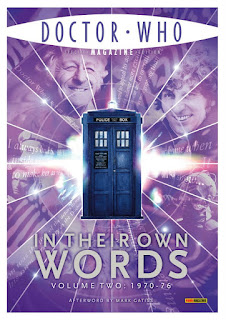 |
 |
 |
 |
 |
 |
The effect is one that's much more story-driven than Talkback. Though I really enjoyed both, and Talkback had the advantage of being able to go in-depth, the story that emerges gave the advantage to In Their Own Words for me.
Though they're all good, the 1963-69 one is very good: it has a nice narrative thrust to it, as you see Doctor Who emerge from nothing into a smash-hit across the course of a year. More than most other things I'm into (Star Trek, Star Wars), Doctor Who isn't the work of a single person, but the triumph of the committee, and the oral history approach really makes that clear. You wouldn't have Doctor Who without Sydney Newman or Anthony Coburn or Verity Lambert or David Whitaker, but you also wouldn't have Doctor Who with only Sydney Newman or Anthony Coburn or Verity Lambert or David Whitaker; there are no Gene Roddenberrys or George Lucases here. I kind of suspect that when Mark Gatiss wrote the script for the 50th-anniversary docudrama An Adventure in Space and Time he did it with a copy of this volume at his side, because its emphases and beats match his almost precisely.
The 1970-76 one is also good; one thing I liked about the series is that its periodization is logical, but also unusual. Most people divide up the show by decade, or by Doctor. Obviously you have to periodize it somehow, but that means you either lump the approaches of Barry Letts, Philip Hinchcliffe, and Graham Williams all together under the rubric of "the 1970s" or you split Barry Letts off on his own as "the Jon Pertwee years." Here, Letts and Hinchcliffe occupy the same volume, while Williams and the early John Nathan-Turner stuff fit into another. Doctor Who is a show of continuous change, but those changes are often but not always gradual; 1970-76 is a good period for showing that.
The 1977-81 volume was probably my favorite other than the first volume. The behind-the-scenes of the Graham Williams years is the producership I knew the least about, and then John Nathan-Turner's first year/Tom Baker's last/Christopher H. Bidmead's only was a period of great tumult and big ideas. The volume only covers only five years, but these years of the program reward that level of depth. The excerpts get a little more personal here than they do elsewhere-- I was constantly reading my wife what Tom Baker and Lalla Ward said about each other and their very brief marriage, and Matthew Waterhouse's comments about Adric have to be read to be believed. (He thinks he would have been a punk rocker!) Seasons Eighteen and Nineteen are one of my favorite periods of the show, and I was delighted with the coverage they received here.
On the other hand, there was less that was new to me in the 1982-86 and 1987-96 volumes. The production of The Trial of a Time Lord and the Sylvester McCoy era is something I know a lot about already. It's nice to see it all in order, but there was nothing as revelatory as in the earlier volumes. Though, I loved the inclusions from Gary Downie, production manager in the 1980s and boyfriend of John Nathan-Turner, whose memory of events almost always disagrees with every other party's! The 1982-86 volume did reinforce my belief that though Eric Saward was a good writer, he was a rotten script editor. (Doctor Who's worst?)
On the other hand, this was probably the most in-depth account of the production of the 1996 television movie I'd ever read, so that was nice. I appreciate that attention was given to what happened when Doctor Who was off the air, with discussion of the Virgin New Adventures, Downtime, Big Finish, The Ultimate Adventure, and so on-- some nice tidbits in there, too.
The last volume wasn't bad, but it was perhaps the least interesting since it wasn't even presenting old information in a new order; it was presenting old information in an old order, as 1997-2009 is the first period of Doctor Who you can say I lived through! Also, not enough time has passed, so the kind of frank comments the contributors can make about 1963-89 can't be made here yet. The definitive story of Christopher Eccleston's only series, alas, is yet to be told. Yet this volume did hit my nostalgia buttons, making me miss Russell T Davies and want to watch series 1-4 of the revival all over again.
Benjamin Cook did a great job in compiling the quotations, and Peri Godbold's design work makes them things of beauty. It's a shame that because they're magazines, not books, they don't have any kind of permanence (it took me years to track down a copy of volume two, since I only started collecting with volume three), as they deserve to be read by any Doctor Who fan who really likes the behind-the-scenes history of the programme.
No comments:
Post a Comment